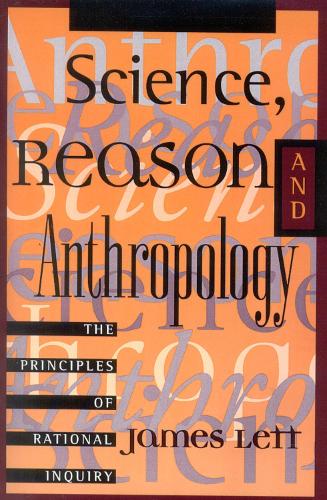
Science, Reason, and Anthropology: A Guide to Critical Thinking
(Paperback)
Publishing Details
Science, Reason, and Anthropology: A Guide to Critical Thinking
By (Author) James Lett
Bloomsbury Publishing PLC
Rowman & Littlefield Publishers
13th November 1997
United States
Classifications
General
Non Fiction
Philosophy: epistemology and theory of knowledge
301.01
Physical Properties
Paperback
160
Width 175mm, Height 228mm, Spine 14mm
272g
Description
For courses on anthropological theory, history, and methods... Science, Reason, and Anthropology explores the philosophical foundations of anthropology and identifies the fundamental principles of rational inquiry upon which all sound anthropological knowledge is based. As a field guide to critical thinking, with examples throughout, it is devoted to a thorough explication and analysis of the nature of reason and the practice of anthropological inquiry. Chapter one reviews the historical context of the contemporary debate between scientific and humanistic perspectives in anthropology, highlighting essential differences between the two approaches. Chapter two examines the nature of knowledge and explains the essential elements of epistemological analysis. Chapter three describes the basic features of the scientific method; it defines science as an objective, logical, and systematic approach to propositional knowledge, and explains each feature in detail. Chapter four applies the fundamental principles of critical thinking to an analysis of contemporary anthropological theory. Chapter five suggests a reconciliation between the scientific and humanistic approaches, arguing that the essential elements of sound reasoning are common to both perspectives. Science, Reason, and Anthropology argues forcefully for the preeminent value of the scientific approach in anthropology, but it does so while recognizing the inherent worth and innate appeal of the humanistic perspective. Even those who are not predisposed to share the author's conclusions will appreciate the clear and forthright manner with which he presents his arguments.
Reviews
Science, Reason, and Anthropology is an exceptional work of articulate scholarshipand a prized contribution to anthropology, ideal for both the student and the scholar of anthropology, as well as the non-specialized general reader with an interest in rational thought and scientific inquiry. * Midwest Book Review *
James Lett provides both a concise guide to critical thinking for students and professionals as well as his own application of critical thinking to the longstanding split in anthropology between science and humanism. Lett works squarely and superbly within the empiricist tradition, which holds that reliable knowledge about what happens in the world and why it happens is best gained by making conjectures and then subjecting those conjectures to possible contradiction by our observations and logical arguments. Clear thinking and clear writing are the hallmarks of this tradition, and Lett delivers on both counts. -- Tim O'Meara, University of Melbourne
Author Bio
James Lett is the author of The Human Enterprise and other notable works on anthropological theory, including contributions to The Encyclopedia of Cultural Anthropology and Emics and Etics.
